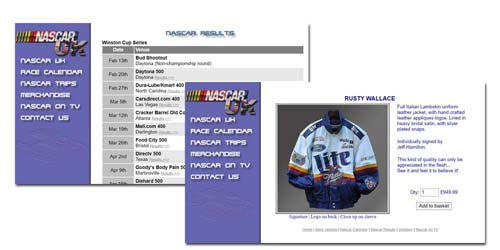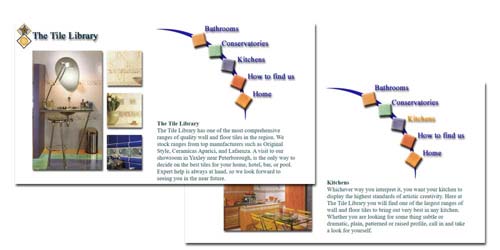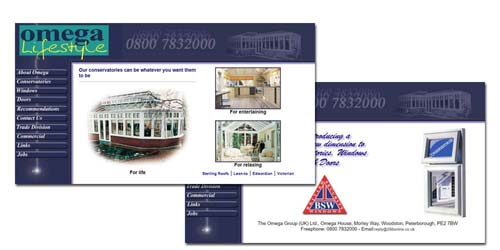A web career which began long before Google
My career to date
In a web career which began way back in 1996, I have spent over 30 years producing and managing websites for businesses of all sizes up to large global corporations.
Daron Harvey
Building and managing websites since 1996

A career in website management
In a nutshell my 30 year long career in web and digital marketing has found me fulfilling a wide and varied range of roles, including:- Web design & development
- Business Analysis
- e-commerce project management
- Usability Testing
- User Acceptance Testing (UAT)
- User Experience (UX)
- Search Engine Optimisation
- Content management
- International website compliance
- Graphic design
- And many other aspects of website creation and management
Let's go back even further...
Like many kids in the late 80's, getting my hands on my first computer... a Dragon 32... was an exciting time, because it meant that playing games through the TV was possible. Movies depicting those times now look so outdated, but living through the introduction of personal computers was great.
It was all new, and it seemed that there were new possibilities and opportunities every day.
Printed Circuit Design
For much of the late '80s and early 90's my day job was to lay out printed circuit boards (PCBs) by hand on a drafting board, using red and blue tape and a scalpel.
But when I learned that some clever folk at P-CAD and Vutrax had created computer software which made laying out PCBs far quicker, easier, more accurate, and less likely to draw blood than a scalpel was in the wrong hands, I made the decision to go digital...
Going Digital - My first proper
PC
I put my Dragon 32 out to pasture and splashed out £2000 on a second hand IBM 286 PC, which I recall had been upgraded from 512mb of RAM to 640mb AND it came with a colour monitor!
Everything was run from the C prompt on the MS-DOS command line, long before anything remotely resembling a visual desktop in the shape of Windows was introduced.
Some freelance PCB design work for Stevenage based Marconi followed during those formative years, along with work for a number of smaller electronics companies throughout the region. It was a great introduction to life with computers, and it was definitely a one way journey forward from that point.
Along came the World Wide Web
Following a few years designing and creating printed circuits for a range of electronic gadgets and appliances, in early 1996 I became curious about the latest craze called the internet
and what phrases like world wide web
and the information super highway
meant.
Of course I was intrigued!
By then I had gone through a number of IBM PCs and I loved trying out new things... new software, a bit of programming, upgrading memory chips and graphics cards... that sort of thing.
But I wanted to find out how the pages on the internet were made. So I got access to a free trial version of a program called HoTMetaL which used HTML to build web pages, and with that I figured out how to build basic websites.
A sobering thought...
It's quite a sobering thought that my first ever practice website was based on the 1996 Formula 1 season, the year before current F1 world champion Max Verstappen was born! By mid 1996 I had started building websites for other people.
Early web design tools
More software hit the market very quickly, and whilst photo editing software such as PaintShop Pro and CorelDRAW provided me with the means to add images to my websites before I eventually got my hands on PhotoShop, I continued with HoTMetaL for a while until moving on to a more professional web design tool called Dreamweaver.
But more about that shortly.
Search Engines - Life before Google
One of my early website clients was Sleeperz Hotel in Cambridge.
After I had built Sleeperz first website and the owner could see that I was having success with high positions in search engines (which back then included AltaVista, Excite, Infoseek, HotBot, Lycos, Yahoo and others), the owner of the hotel suggested hiring me regularly for one day every two weeks for search engine work.
He wanted me to ensure that his positions in those search engines were maintained, because more of his competitors were coming online, and we needed to make sure that the Sleeperz Hotel website stood its ground.
That was my first SEO retainer, and it turned out to be time well spent, and a good investment by the owner of the hotel.
Other early clients
More websites followed for other local businesses including Premier Kitchens and Bedrooms, Midas Engineering, Omega Lifestyle, The Tile Library, as well as NASCAR UK and a number of hospitality, catering, manufacturing and sportswear companies, and a local travel company based near Ely in Cambridgeshire.
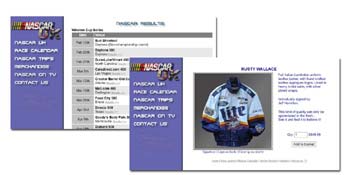
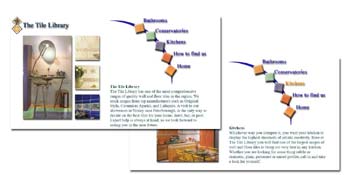
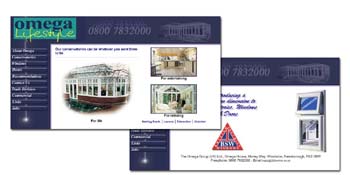
A career in e-commerce
After 4 successful years as a freelance web designer, in September 2000 I was invited to join Hertz Europe as senior web designer. Hertz is a global car rental company with more than 8,000 locations worldwide, and they were putting together a team of web experts to build and maintain their e-commerce platform.
This was to be a new chapter, and the beginning of an incredible journey.
A move into e-commerce
After 4 successful years as a freelance web designer, in September 2000 I was invited to join Hertz Europe as senior web designer.
A move into e-commerce with Hertz
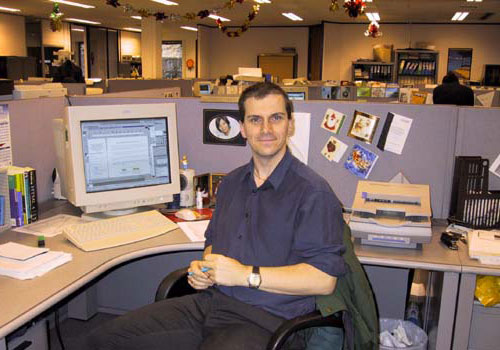
Coding and staying in control
Staying in control
What quickly became clear when joining Hertz in 2000, was that I needed to learn to code by hand, my use of Dreamweaver to format my web pages needed to come to an immediate end, because the tools and capabilities built into Dreamweaver automatically caused it to add extra code of a file whether we wanted it to or not.
Software taking control - Not always a good thing!
In some cases Dreamweaver would automatically reformat and mess up the dynamic code that we were writing, which at the time was ColdFusion. Due to programs like that taking over and reformatting what had previously been correctly written code, only hand coding was allowed from that point.
It was a steep learning curve for me, and even today I prefer to hand code websites and maintain control instead of allowing website builder tools such as WordPress, Wix and others to do it for me in their own way, which... based on my own observations... are often less than desirable, potentially problematic and can be very restrictive.
Life in e-commerce at Hertz
I spent the next 20 years in various roles building and managing dynamic e-commerce websites in 28 languages.
The workload was intense, and we constantly needed to come up with new and innovative ways to expand on the capabilities of our websites to cater for the personal needs of different types of customers.
We devised ways to customise the customer journey from the moment they arrive on the homepage, and by automatic detection of their location we could predict which language to display the website in, and how to dynamically display relevant banner ads on the homepage.
Making predictions without a crystal ball
The homepage banners were used to promote special offers which we had built into databases using SQL Server, and also banners to encourage visitors to enroll into our loyalty scheme, which allowed us to further customise and streamline the user journey.
Of course these predictions could not always be 100% accurate in every case, and so we would always provide the means of allowing the customer to change the language we had defaulted the website to, as well as changing other things to more accurately reflect their circumstances.
Dynamic customer focused websites
Although I had arrived at Hertz in 2000 with plenty of HTML and JavaScript experience, this was to be my introduction to building dynamic websites which are truly based on the customer, with each website visit determined by such factors as:
- the selections a user makes;
- the country they're from;
- their language;
- where and when they want to rent a car;
- the vehicles available at that place and time;
- the cost of each vehicle for the time period selected;
- the ability to add things such as child seats which also impacted the cost;
- providing different payment options at different rates;
- currency conversion;
- displaying prices inclusive or exclusive of tax, as relevant to international laws, rules and expectations;
- further streamlining and personalising the customer journey for loyalty scheme members;
- ... etc
Some of these principles are common place now, but at the time we needed to think ahead and be creative in devising ways of doing things which would improve the experience for our customers, and help us stand out from our competition. Of course our competition were not standing still either!
Before Content Management Systems (CMS) arrived
Before CMSs arrived
Before Content Management Systems (or CMS as they're also commonly known) arrived on the scene, handling multiple languages on a dynamic web platform initially involved creating a number of files, each containing several hundred variables which held words, sentences and paragraphs in different languages.
We needed to be creative in how that content was efficiently used and managed, and after several years of coding our own multi-lingual solutions, we eventually employed the services of the Interwoven CMS, and later AEM (Adobe Experience Manager).
Customising each and every experience
Building dynamic websites allowed far more possibilities than static websites could offer. No business or customer is the same, so by providing a mix of automation and customisation we allowed the user experience to be tailored for the needs of each user.
There were mandatory requirements too, because it was not only important to communicate the legal aspects of hiring a car abroad, such as age restrictions which vary from country to country, but to also dynamically tailor the list of vehicles offered for selection based on the age range that the customer selected at the beginning of the process.
100 years of Hertz
Hertz 100 year celebrations
Pictured here in 2018 with former President of Hertz International, Michel Taride, and colleagues from marketing and e-commerce
Hertz 100 year celebrations
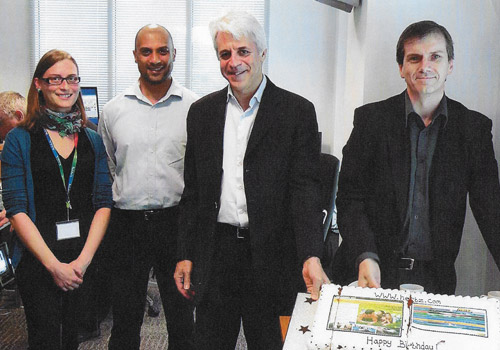
Managing partnership and franchisee implementation
Partnership and franchisee implementation
My role at Hertz also involved managing a number of corporate partner websites for several airline partners, including Ryanair, Aer Lingus, Air France and Qatar Airways, as well as the development and launch of a loyalty scheme rewards portal for Hertz's partnership with Nectar.
Managing those partnerships along with Hertz franchisees, and being in the core team for a multi-million dollar global digital transformation project, many air miles were clocked up with frequent travel between offices in the UK and various locations in the US and Europe.
Payment Security and Compliance
In addition to the above I was also responsible for managing the original implementation of 3D Secure onto the Hertz main web platform, which allowed us to handle card payments more securely via the Verified by Visa and MasterCard SecureCode processes.
From around 2014 I was also given the responsibility of making sure that our websites were legally compliant, with a strong emphasis on pricing transparency, and ensuring compliance with EU regulations and other regulatory bodies worldwide.
As part of this initiative I became responsible for the implementation and management of the dynamic delivery of relevant Terms and Conditions and other dynamic legal and advisory messaging based on the customer type, their location, destination and other selections they make during the reservation process.
High sales volumes
High volumes
At the peak during my time with the company, the Hertz websites were generating in excess of $3.5 billion US Dollars in annual online sales, and I remained with the company until Covid hit. By this time I was working heavily with IBM in developing our new platform.
$3.5 billion US Dollars
Those 20 years in the corporate e-commerce world also provided me with project management, business analysis experience, CSPO (Certified Scrum Product Owner) certification and many other core web management skills.
Ongoing development, management and testing
Development never stood still. There was constant development of the main core platform, the backend systems, and of the 3rd party websites which interacted with our systems.
Such intense, consistence and widespread development required meticulous attention to detail, not only in the planning and documentation, but also in the testing. Therefore the following types of testing always formed part of the development process.
- A-B testing and multivariate testing on prototypes to ensure that we were designing and developing what customers wanted.
- User Acceptance Testing to ensure that what had been development satisfied the business requirements for each project before the projects go live.
- Regression Testing to ensure that everything which worked before the development of new projects still worked after their completion.
Business Continuity
Whilst at Hertz I was also tasked with business continuity planning, setting out set out how emergency restructuring due to unforeseen circumstances would enable the business to carry on functioning as efficiently and effectively as possible.
What I do now
When the covid pandemic impacted many industries including the travel industry, I made the decision to start TargaWeb and use my years of experience in global car rental eCommerce to help businesses thrive online with a range of fixed price and bespoke website services.
However...
With mainstream website production becoming more commoditised, it made sense for me to specialise by to combining my 30 years of web development and several years of pricing clarity experience, and focus on the development of bespoke pricing calculators for website visitors, sales teams and trades people.
And so targacalc.com was born, and continues to flourish.
Keeping up to date
Despite years of proven experience, things evolve and it is therefore essential to keep skills and knowledge sharpened. In addition to keeping up to date and following software testing best practices of the ISTQB (International Software Testing Qualifications Board), below is a list of current certifications acquired:
Business
- Business Analysis
- Business Benefits Realisation
- GDPR
- Social Media Marketing Foundations
- SEO Strategy (issued by SEMRush)
Testing
- Agile Requirements
- Agile Testing
- Manual Testing
- Software Testing: Transitioning from Manual to Automation
- Software Testing Foundations: Test Management
- Software Testing Foundations: Test Planning
- Software Testing Foundations: Test Techniques
- JIRA Fundamentals
Design & Development
Connect with me on LinkedIn
Connect with me on LinkedIn
You can learn more about my professional background on LinkedIn and I'd be happy to add you to my network
Connect with me on LinkedIn

Reviews and Testimonials
Check out some of my personal reviews and testimonials and feel free to get in touch if you think I can help.
Get in Touch
I am based centrally in the UK with easy access to the major cities, and have worked with companies on sight and remotely in the UK and internationally, in time zones as diverse as Western US and Australia.
You can learn more about my professional background on LinkedIn, and if you would like to discuss anything further, feel free to reach me by email or phone, or book a 30 minute slot at a time to suit you:
Email: daron@targaweb.com Phone: 01406 373511
